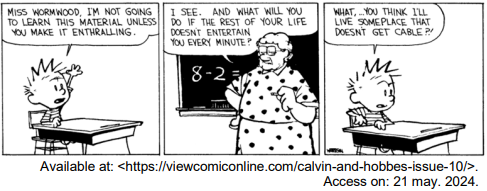Text 3
A teacher’s experience of using technology in language
teaching
Published 29 October 2021
Using technology has always been an important part of my
teaching, even in the pre-digital age. Like many early adopters, I
get super-excited by the ‘wow’ factor of new technology.
However, some technology (like VR – virtual reality) is still quite
challenging to use successfully. In my own teaching, I’m happy to
incorporate tools which are rather more familiar. (...)
Speaking
My
EAP (English for Academic Purposes) students naturally use
PowerPoint to deliver their presentations. The software is so
familiar that they are unaware that they are using technology!
Classes concentrate on strategies for making a talk effective,
such as incorporating memorable images and reducing text to just
key words. Many of my students have serious pronunciation
difficulties, so revealing a word at the same time as saying it helps
them to be understood by the audience.
Like many teachers, I like the engagement and interactivity
afforded by Kahoot! My favourite voting app is Mentimeter
because it is quick to create a poll, reliable and easy-to-use.
Voting anonymously is significantly different from putting up your
hand. Doing it remotely remains an exciting event – watching as
students’ votes come in. A great way to finish a discussion lesson
on controversial issues is with a class vote.
I encourage fluency in the classroom but also ask students to do
more discrete practice away from the classroom using their
mobile phones – recording themselves, listening and rerecording. They can try out voice searches which are hugely
motivating when you achieve success! (...)
Vocabulary
Many of my new students don’t have a system to record and
review the new vocabulary we cover in class. As part of their
learner training, I present the app Quizlet which allows learners to
create sets of digital flashcards. It’s free. Students who choose to
try it can decide what to write on the back of a card – a translation
or a personalised example sentence containing a new word. The
app automatically creates games such as matching exercises and
Pelmanism, which some learners enjoy.
I am a big fan of graphic organisers and have long encouraged
students to use mind-maps. Having free versions such as
Mindomo is beneficial in helping store words in concept groups
and in reviewing new language.
SHARMA, P. A teacher’s experience of using technology in language teaching.
World of Better Learning Blog. Available at:
https://www.cambridge.org/elt/blog/2021/10/29/technology-language-teaching/. Access on: 20 may. 2024. [Adapted].
